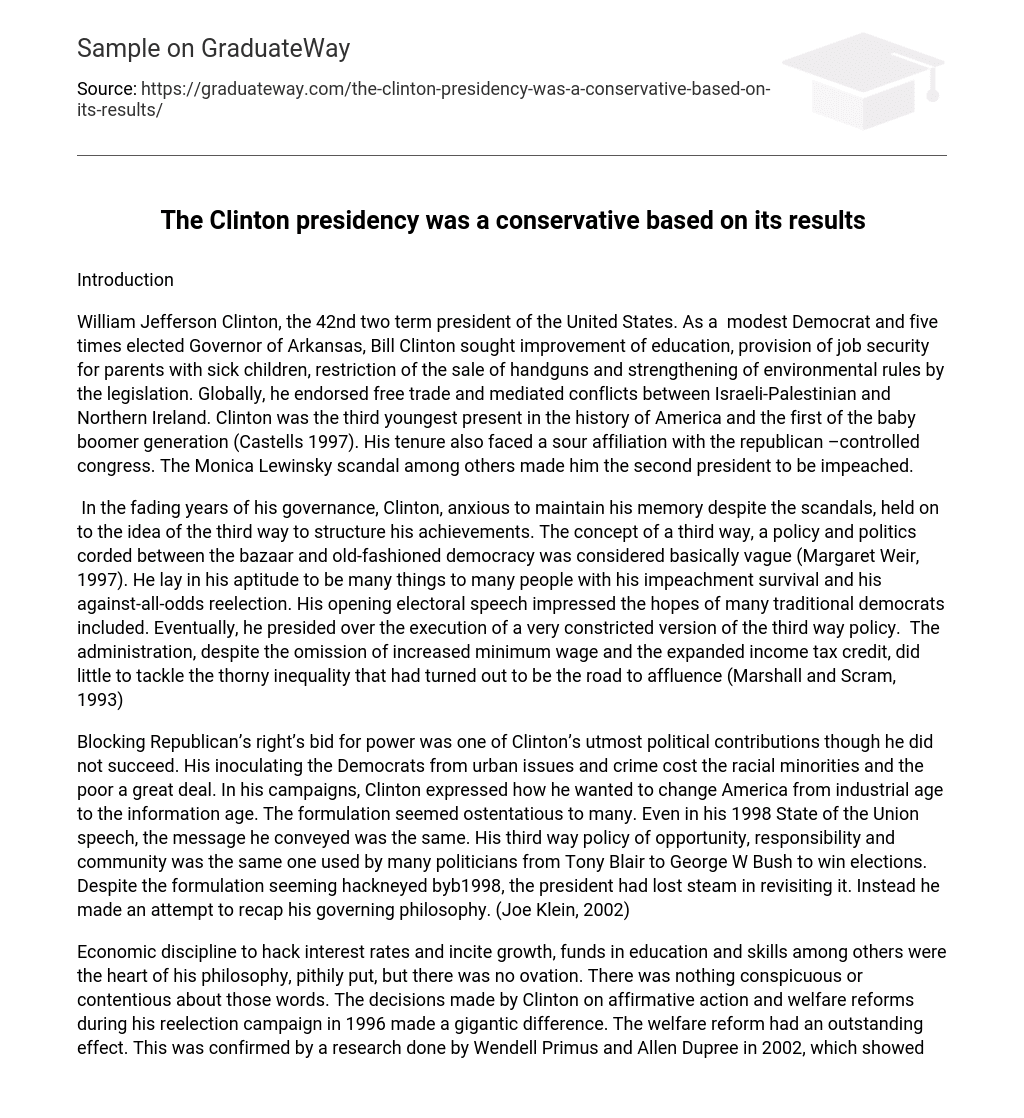Introduction
William Jefferson Clinton, the 42nd two term president of the United States. As a modest Democrat and five times elected Governor of Arkansas, Bill Clinton sought improvement of education, provision of job security for parents with sick children, restriction of the sale of handguns and strengthening of environmental rules by the legislation. Globally, he endorsed free trade and mediated conflicts between Israeli-Palestinian and Northern Ireland. Clinton was the third youngest present in the history of America and the first of the baby boomer generation (Castells 1997). His tenure also faced a sour affiliation with the republican –controlled congress. The Monica Lewinsky scandal among others made him the second president to be impeached.
In the fading years of his governance, Clinton, anxious to maintain his memory despite the scandals, held on to the idea of the third way to structure his achievements. The concept of a third way, a policy and politics corded between the bazaar and old-fashioned democracy was considered basically vague (Margaret Weir, 1997). He lay in his aptitude to be many things to many people with his impeachment survival and his against-all-odds reelection. His opening electoral speech impressed the hopes of many traditional democrats included. Eventually, he presided over the execution of a very constricted version of the third way policy. The administration, despite the omission of increased minimum wage and the expanded income tax credit, did little to tackle the thorny inequality that had turned out to be the road to affluence (Marshall and Scram, 1993)
Blocking Republican’s right’s bid for power was one of Clinton’s utmost political contributions though he did not succeed. His inoculating the Democrats from urban issues and crime cost the racial minorities and the poor a great deal. In his campaigns, Clinton expressed how he wanted to change America from industrial age to the information age. The formulation seemed ostentatious to many. Even in his 1998 State of the Union speech, the message he conveyed was the same. His third way policy of opportunity, responsibility and community was the same one used by many politicians from Tony Blair to George W Bush to win elections. Despite the formulation seeming hackneyed byb1998, the president had lost steam in revisiting it. Instead he made an attempt to recap his governing philosophy. (Joe Klein, 2002)
Economic discipline to hack interest rates and incite growth, funds in education and skills among others were the heart of his philosophy, pithily put, but there was no ovation. There was nothing conspicuous or contentious about those words. The decisions made by Clinton on affirmative action and welfare reforms during his reelection campaign in 1996 made a gigantic difference. The welfare reform had an outstanding effect. This was confirmed by a research done by Wendell Primus and Allen Dupree in 2002, which showed a decrease in the number of children living with single parents by 8% five years after passing the bill. It gave the impression that Clintons work had not only paid, but he had done away with the old school unintended marriage. Among his great achievements is rescuing the Democratic Party from insignificance and pursuing a new philosophy of presidency that made the public sector activism once more plausible (Joe Klein, 2002).
Conclusion
Amid the scandals, dashed hopes and acrimony of Bill Clinton’s tenure, a great deal of authentic work was done. He performed a serious, substantive government. His domestic principle accomplishments were not inconsiderate and he achieved them against all odds. Bill Clinton will be remembered for executing the most important service a leader can provide (Joe Klein, 2002)
Works Cited:
Woodward, Bob. ‘The Agenda: Inside the Clinton White House’ New York: Simon and Schuster, 1994.
Castells, Manuel. ‘The Information Age: Economy, Society and Culture,’ Volume II, Blackwell Publishers, 1997
Weir Margaret and Marshall, Ganz, ‘Reconnecting People and Politics’ New Haven: Yale University Press, 1997.
Joe Klein. ‘The Natural: The Misunderstood Presidency of Bill Clinton:’ Cahners Business Information, Inc 2002





